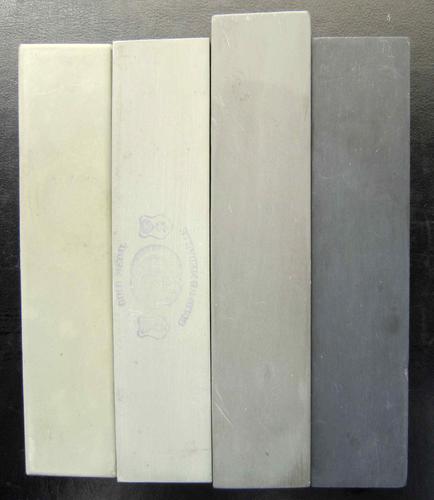Results 11 to 14 of 14
Thread: Escher Hone ID confirmation?
-
08-02-2021, 01:37 AM #11Junior Member

- Join Date
- May 2021
- Posts
- 3
Thanked: 0 Additional image
Additional image
Another image of the Escher (apparently) that started this thread but in outdoor natural light. Not sure of color. Pretty dark.
-
08-02-2021, 02:48 AM #12Hones & Honing




- Join Date
- May 2005
- Location
- Saint Paul, Minnesota, United States
- Posts
- 8,023
- Blog Entries
- 1
Thanked: 2209
.
.
To a collector the color, completeness of the set ( stone and slurry stone), the condition of the box, would be important. But to the rest of us the only important thing is the quality of the edge on the razor.Randolph Tuttle, a SRP Mentor for residents of Minnesota & western Wisconsin
-
08-04-2021, 09:01 AM #13

Here is mine i own which i can add to the post. The Boxes appeared in various colors as far as i can say it seems not that the coloration of the boxes is in any way connected to the Qualities (DB, YG, Green, light green) of the stones sold.



Last edited by doorsch; 08-04-2021 at 09:03 AM.
███▓▒░░.RAZORLOVESTONES.░░▒▓███
-
The Following User Says Thank You to doorsch For This Useful Post:
outback (08-04-2021)
-
08-15-2021, 10:57 AM #14

So as promissed – with a little dealy – here is a color comparrison of thuringian hones.
Normally thuringinas are classified in 4 colors: yellow-green (yg), light green (lg), blue-green (bg) and dark blue (db).
But that doesn’t mean that each color was only 1 layer of stone. As reported elsewhere here in this forum (https://sharprazorpalace.com/hones/9...-combos-7.html), in fact thuringian whetstone makers have exploited about 170 different layers within the quaries, all of more or less different color. But all of these have been classified in only the four a.m. qualities.
Also the mining of different layers have been done in different phases, beginning early 1800 and in the first decades blue stones haven’t been mined at all.
The standard quality was named ligth green and all colors from green to each shades of grey have been classified here. Most thuringians you find on the market today will be light green ones.
However two green color gamuts have been seperated.
On the lower part of the color palette there was the yellow-green. All yg-hones are more yellow than green or have at least a certain yellow hue in the stone matrix.
You can also distinguish the yg hones from the light green ones by the color of their slurry. Slurry from yg hones is alway a bit yellow, light green slurry is white. You can see this best by putting a bit of slurry on a black background.
On the other side, were green turns into blue you will find the blue-green hones. The real bluegreen color is a unique color of dark turquiose. It isn’t really easy to decide the bg from lg hones.
Later in mining, also hones with a certain change in color from green to blue were named blue-green.
Both, the yg on one side and the bg on the other side have normally been of better quality than the lg hones.The differences can be small though and you can find excellent lg hones also of better quality than some yg gor bg.
As said the mining of the blue stones began later, mainly as the other colors have been mostly exploited. The paticle size of quartz in the blue hones reach much higher maximum, therefore the hones are not as fine as the other qualities. But also here, of course exceptions are present.
Attached are typical colored stones from each quality, ranging from yg on the left to dark blue on the right.

The bluegreen is a bg-labelled Escher hone. The colors are better visible if the stones are wet:

Regards Peter
-


 56Likes
56Likes LinkBack URL
LinkBack URL About LinkBacks
About LinkBacks






 Reply With Quote
Reply With Quote